10 important soft skills examples and why your workforce needs them
Whatever the role or sector, success in the workplace relies on more than just industry experience and technical knowledge. In order to work effectively with others, follow procedures accurately and continue to develop their careers, employees also require a variety of professional and interpersonal competencies, collectively known as soft skills.
In this article, we’re going to explore what soft skills in the workplace are and why they’re important for employers and employees alike. We’ll also give some examples of the most important soft skills for business owners, managers and HR professionals to foster in their employees.
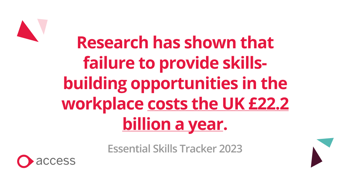
What are soft skills in the workplace?
Soft skills are certain traits that can help an employee to be successful in the workplace. Unlike hard skills, where a person may hold a particular certification or be experienced in using a piece of software, soft skills are more difficult to quantify. They often revolve around interpersonal relationships and emotional intelligence, as well as the ability to remain organised and professional. Some soft skills examples include communication, creativity and initiative.
While certain soft skills may seem more relevant to some roles than others, the very nature of these traits means that they are readily transferable to a variety of different applications. It’s therefore important not to pigeonhole by job title, age, gender or level of seniority, and to instead focus on building soft skills holistically throughout your organisation.
For example, fostering soft skills for teamwork will help people who work within set teams to function better as a unit, meet deadlines and improve morale. However, working as a team doesn’t only cover interactions with those in one’s immediate department; it also incorporates learning how to effectively communicate and cooperate with people on all levels. This is useful when dealing with external organisations, members of the public, and stakeholders at a senior level.
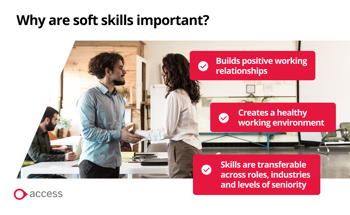
Why are soft skills important?
Soft skills in the workplace help to build better relationships and build a culture of support and mutual respect across the organisation. For example, higher levels of emotional intelligence give employees a deeper insight into the needs and experiences of others. This allows them to approach challenging situations with empathy and positivity, creating a healthy working environment that facilitates teamwork, boosts morale and keeps projects on track.
As well as benefiting employees on an individual level, soft skills support profitability by improving staff retention rates and minimising the need for costly recruitment. Investing in developing soft skills in your workforce can help business growth and development by promoting efficiency, driving innovation and creating new opportunities. In fact, research has shown that failure to provide skills-building opportunities in the workplace costs the UK £22.2 billion a year.
Soft skills tend to be easily transferable across a variety of roles, industries and levels of seniority, making them an extremely valuable tool for all employees. Certain soft skills such as empathy, delegation and integrity can also help to develop leadership skills and create resilient leaders to further support and motivate the workforce. In the same report, 92% of workers said that soft skills were important for their careers, with only 84% saying the same of sector-specific knowledge.
This shows the usefulness and versatility of soft skills, as well as offering an insight into the UK workforce’s interest in developing these essential traits.
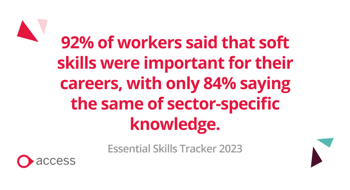
Hard and soft skills: What’s the difference?
Hard skills refer to specific, teachable abilities or knowledge that tend to be job-specific and technical in nature. They can typically be learned through formal education, training programs, or on-the-job experience. Examples of hard skills include proficiency in programming languages, statistical analysis, machine operation, or fluency in a foreign language.
Soft skills, on the other hand, usually focus on personal attributes, traits, and behaviours that influence how individuals interact and work with others. They are often linked to emotional intelligence and personality traits, and are therefore harder to quantify than hard skills. Examples of soft skills include communication, teamwork, organisation and time management.
While hard skills are necessary for specific tasks or roles, soft skills are more about how effectively an individual can apply those hard skills in various situations. Both hard and soft skills are important in the workplace, with most roles requiring a combination of both. Possessing certain hard skills might be enough for an employee to be hired, but soft skills often determine the success of their career and the quality of their working relationships.
We offer a comprehensive suite of accredited eLearning courses, written by experts and regularly updated.
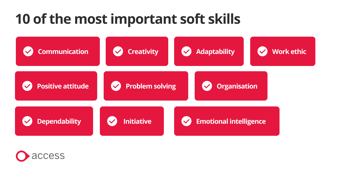
10 important soft skills
Employees in all sectors, roles and levels of seniority need a variety of skills to help them to better perform their duties and work successfully with their colleagues. In particular, soft skills for teamwork can help to improve interpersonal relationships, making for a more enjoyable working environment. This can lead to increased staff wellbeing, productivity and retention.
Let’s look at each of these soft skills in more detail:
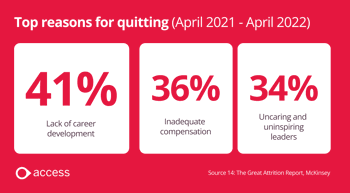
Why you should invest in soft skills for business
Everyone has different skill sets, career ambitions and areas to improve, yet many employers fail to provide personalised or self-directed learning to support their employees. With more and more competition in the business world, it’s important for employers to focus on setting themselves apart from other organisations. This includes both separating themselves from the competition by investing in talent that can grow and diversify business, but also distinguishing themselves as an attractive workplace for current and future employees.
A lack of career development is one of the top reasons that employees choose to leave a role. Providing opportunities for employees to upskill and develop their hard and soft skills is an effective way to boost job satisfaction and foster organisational loyalty.
This helps you to retain talent and avoid the costs associated with hiring and training new staff. Developing a culture of learning within your organisation that goes beyond traditional, generic training can help to support business operations while also improving employee satisfaction. With the average cost of replacing an employee currently at around £3,000, employee retention is an essential part of business growth and development strategies.
It’s worth noting that proactively upskilling your employees is often more efficient than recruiting for the skills you need. This enables you to capitalise on an employee’s existing interpersonal relationships within the organisation, knowledge of the business, and their fit within the company culture. As well as hard skills, there are many important soft skills for business that can also be taught through training and development initiatives.
Want to learn more about upskilling and why it's important for the growth of your business?
How to develop soft skills in your workforce
Providing access to a variety of workplace soft skills courses is a great way to boost job satisfaction and employee retention while offering many benefits to your organisation. Managers, team leaders and HR professionals should consider providing learning opportunities alongside standard topics such as compliance training outside of the standard compulsory/compliance driven training, and identify employees who either need to develop more soft skills, or are actively pursuing career development opportunities. Regular employee satisfaction surveys and performance reviews backed up by Individual Development Plans can provide valuable insights into the types of training and development opportunities that employees would benefit from.
Like any other type of skill, soft skills take time to learn and develop, and the more they are practiced, the stronger they will become. Employees who are looking to develop their soft skills should be encouraged to:
- Be open to stepping out of their comfort zone
- Work with different departments and people
- Embrace training opportunities
- Adapt to change and different ways of working
- Readily take feedback on board
When you invest the development of the soft skills within your workforce, your employees will no only thrive in their roles but feel valued and fulfilled. We have a comprehensive catalogue of eLearning courses available to facilitate and encourage workplace learning. Offering this alongside a robust career development platform will help to identify any soft skills gaps and empower your employees to develop them,
Drive a learning culture with Access Learning

Download our brochure
Our eLearning course catalogue lets you explore our extensive CPD accredited Workplace Soft Skills content.

Speak to an expert
Chat with one of our learning experts and find out how our Workplace Soft Skills courses can help your organisation boost productivity and retain staff.

Schedule a live demo
Explore the features, functionality and benefits our Workplace Soft Skills courses have to offer and ask questions to our learning experts.